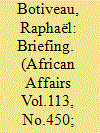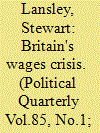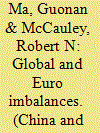|
|
|
Sort Order |
|
|
|
Items / Page
|
|
|
|
|
|
|
| Srl | Item |
| 1 |
ID:
131835


|
|
|
|
|
| Publication |
2014.
|
| Summary/Abstract |
MORE THAN A YEAR AFTER the South African police killed 34 strikers in Marikana, labour unrest continues across the country's mining sector. Industrial actions have targeted platinum giants like Amplats, the world's largest producer, where an 11-day strike over planned retrenchments has just ended and another is looming amid fresh wage talks. Rivalry between the National Union of Mineworkers (NUM) - aligned with the African National Congress (ANC) - and the more recent and militant Association of Mineworkers and Construction Union (AMCU) has also plagued the industry. On 17 October, an NUM branch chairperson at Lonmin - the third largest platinum producer in the world - was shot dead. Another Lonmin NUM shaft steward died in a similar situation on 3 November. A few months ago a former NUM leader who had become the AMCU regional representative in Rustenburg was ambushed - one of several from both sides assassinated since the Marikana massacre. In other words, the 'Framework Agreement for a Sustainable Mining Industry', promoted by South African Deputy President Kgalema Motlanthe and signed by parties to the industry on 3 July 2013, has so far failed to restore peace to the mining sector in Africa's largest economy.
|
|
|
|
|
|
|
|
|
|
|
|
|
|
|
|
| 2 |
ID:
130943


|
|
|
|
|
| Publication |
2014.
|
| Summary/Abstract |
Is 'predistribution' as championed by Ed Miliband, or old fashioned 'redistribution' as adopted, if stealthily, by Labour from 1997, the best way to create greater equality? Some critics have argued that a strategy of predistribution-aimed at closing the income gap before the application of taxes and benefits-would not work and that it will be necessary to rely mainly on redistribution. This article examines the potential impact of weak and more radical predistribution-style measures on one of the key drivers of inequality-'wage compression'. It examines the potential of a mix of policies for raising the wage floor. It argues that reliance on traditional redistribution would face its own set of constraints and that creating a more equal distribution of the cake, before taxes and benefits, is a necessary condition for lowering the risk of continuing economic crisis.
|
|
|
|
|
|
|
|
|
|
|
|
|
|
|
|
| 3 |
ID:
130971


|
|
|
|
|
| Publication |
2014.
|
| Summary/Abstract |
We analyze global and euro area imbalances by focusing on China and Germany as large surplus and creditor countries. In the 2000s, domestic reforms expanded the effective labor force, restrained wages, shifted income toward profits and increased corporate saving. As a result, the Chinese and German current account surpluses widened, and that of Germany has proven more persistent, with subdued domestic investment. China is an early-stage creditor, holding a short equity position and a long position in safe debt. Germany's balanced net debt and equity claims mark it as a mature creditor that provides insurance to the rest of the world. China pays to lay off equity risk, while Germany, by contrast, harvests a moderate yield on its net claims. In both economies, the shortfall of the net international investment position from cumulated current account surpluses arises from exchange rate changes, asymmetric valuation gains, and, in Germany's case, credit losses.
|
|
|
|
|
|
|
|
|
|
|
|
|
|
|
|
|
|
|
|
|